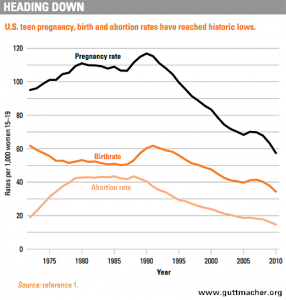When I tell people I have been talking to teens about sex, dating and relationships for two decades, many adults say “they sure need that!” They recognize the problems of teen pregnancy, STDs and dating abuse. Second, they wonder why I’d think it’s effective to encourage teens to draw a line and not become sexually active. They state about teens, as a know fact, that “everybody’s doing it” and assume that the best we can do is provide condoms…and abortions and medicine for their recurring herpes sores when condoms fail.
I get a real kick out of telling adults and teens that “Well, actually, it’s not true that everybody’s doing it.” In fact, we have solid data going back to the early 1990s showing dramatic and steady decreases in teen sexual activity over the last 30 years. Every other year, as the newest Youth Behavior Risk Survey (YRBS) comes out, I have to revise my teaching to reflect the latest data. A couple of years ago, it was “almost 60%” of high school students have never had sex,” then “over 60%,” and now “almost 62%” have never had sex. Some other measures of teen sexual behavior are also going the same direction. In 1991 over 10% of 13-year-olds had had sex, and now it’s less than a third of that…3% as the above-linked YRBS chart shows. The truth is, adults who are fatalistic about teens experiencing sexual activity should believe more in the ability of teens to make healthy choices.
There are a lot of reasons why avoiding sexual activity is beneficial physically, socially, emotionally and mentally. Many have been covered in this blog. One I haven’t mentioned, that has a lot of solid data behind it, is how the timing of childbearing significantly impacts the course of not only an individual’s life, but family life and indeed society. What am I talking about? It’s called “The Success Sequence.” One of the researchers into future success and family formation explains in 60 seconds what it is: LINK
Quite simply the success sequence is this: Get at least a high school degree, find full-time work, and marry before having any children…in that order. The US Department of Human Services has posted some of the research on the Success Sequence, showing for instance, that “95 percent of Millennials who married first are not poor, compared to 72 percent who had children first.” Additionally, “71 percent who married before having children made it into the middle or higher end of the income distribution by the time they are age 28-34. By comparison, only 41 percent of Millennials from lower-income families who had children first made it into the middle or higher end of the distribution when they reached ages 28-34.” As one African American leader noted…marrying before having kids is the “great equalizer” economically.
So let’s connect the dots. During the same 30 years that the percent of teens having sex has decreased, teen pre gnancy (and births and abortions) have also decreased dramatically. If we can encourage teens to keep going the direction they are already going…we can impact their future, and all of society, for the better. Isn’t that what we want for our kids? One Illinois organization is currently distributing to teachers and community leaders (through a government grant) an online course for teens based on the idea of sexual abstinence as a healthy choice. More can be found at successsequence.com.
gnancy (and births and abortions) have also decreased dramatically. If we can encourage teens to keep going the direction they are already going…we can impact their future, and all of society, for the better. Isn’t that what we want for our kids? One Illinois organization is currently distributing to teachers and community leaders (through a government grant) an online course for teens based on the idea of sexual abstinence as a healthy choice. More can be found at successsequence.com.
